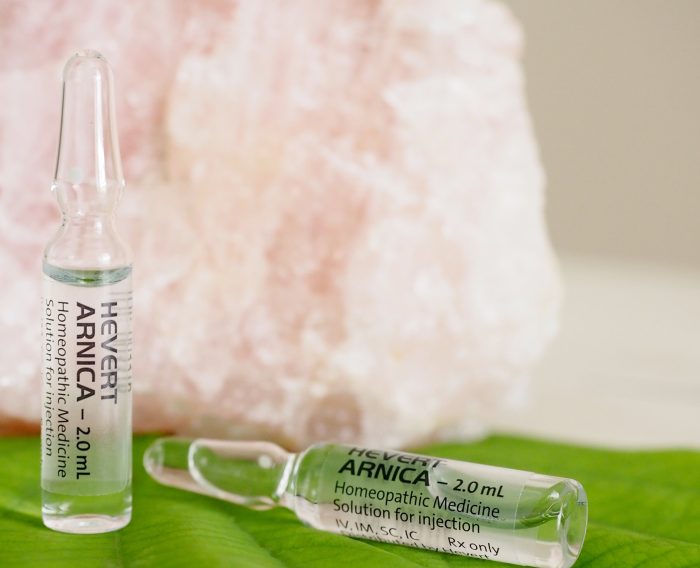Homeopathy
What is homeopathy?
Homeopathy is derived from the Greek words for “like” and “suffering.” The guiding principle behind homeopathy is “like cures like,” originates from Egypt and ancient Greece. In the late 18th century, a German physician named Samuel Hahnemann read that quinine-containing Peruvian bark (chinchona) cured malaria. Hahnemann swallowed a dose of Peruvian bark and began to feel feverish, drowsy, extremely thirsty, and agitated, which are all symptoms of malaria. Hahnemann started to experiment more and formed his theory that like cures like, or the Law of Similars: that when a substance in large doses causes certain symptoms, in small doses it can cure these same symptoms.
Herbs and other plants, minerals, venom from snakes, and other substances can be used to make homeopathic remedies. They are diluted again and again and “succussed” or shaken vigorously between each dilution. The process of sequential dilution and succession is called potentization.


How does homeopathy work?
Homeopathic remedies start with substances, such as herbs, minerals, or animal products. These substances are first crushed and dissolved in a liquid, usually grain, alcohol, or lactose, mechanically shaken, then stored. This is the “mother tincture.” Homeopaths then dilute tinctures more with alcohol or lactose, either 1 part to 10 (written as “x”) or 1 part to 100 (written as “c”). These tinctures are shaken, yielding a 1x or 1c dilution. Homeopaths can further dilute these tinctures 2 times (2x or 2c), 3 times (3x or 3c), and so forth. Many times professional homeopaths will use much higher dilutions, because they believe the more diluted the substance, the more potent its healing powers.<!–more–>
Homeopathic remedies aim to stimulate the body’s own healing mechanisms. Homeopaths believe that physical disease often has mental and emotional components, so a homeopathic diagnosis includes physical symptoms (such as feverishness), current emotional and psychological state (such as anxiety and restlessness), and the person’s constitution. A person’s constitution includes qualities related to creativity, initiative, persistence, concentration, physical sensitivities, and stamina. The right remedy for a condition will take all of these aspects into account, so each diagnosis and remedy is individualized. That means 3 people with hay fever could need 3 different prescriptions.
Health food stores and some pharmacies sell homeopathic remedies for a variety of problems. Homeopaths often recommend taking remedies for no more than 2 to 3 days, although some people may need only 1 to 2 doses before they start feeling better. In some cases, homeopaths may recommend daily dosing.
What happens during a visit to the homeopath?
Your first visit to the homeopath can take from 45min to an hour. Because homeopaths treat the person rather than the illness, the homeopath will interview you at length, asking many questions and observing personality traits, as well as unusual behavioral and physical symptoms. The homeopath may also perform a physical examination and possibly order laboratory work.


What illnesses and conditions respond well?
Scientific evidence is mixed. In some clinical trials, homeopathy appeared to be no better than placebo. In other clinical studies, researchers believed they saw benefits from homeopathy. More research is needed.
Preliminary evidence shows that homeopathy may be helpful in treating childhood diarrhea, otitis media (ear infection), asthma, fibromyalgia, chronic fatigue syndrome, symptoms of menopause (such as hot flashes), pain, allergies, upper respiratory tract infections, sore muscles, and colds and flu. Some professional homeopaths specialize in treating serious illnesses, such as cancer, mental illness, and autoimmune diseases. In fact, several studies suggest there may be a role for homeopathy in symptom relief and improving quality of life among cancer patients. You should not treat a life-threatening illness with homeopathy alone. Always make sure that all your health care providers know about the therapies you are using.
Homeopathic medicines, because they are diluted, generally do not have side effects. However, some people report feeling worse briefly after starting a homeopathic remedy. Homeopaths interpret this as the body temporarily stimulating symptoms while it makes an effort to restore health. In people who have serious illnesses, these temporary aggravations of symptoms can be very harmful. If you have a serious physical or mental illness, you should only use homeopathy under the guidance of a trained practitioner and inform everyone on your health care team about any homeopathic medicines you are taking.
Homeopathic medicines that are sufficiently diluted are not known to interfere with conventional drugs, however, if you are currently taking prescription medicines you should consult your doctor if you are considering using homeopathic remedies.
Is homeopathy regulated?
The U.S. Congress passed a law in 1938 declaring that homeopathic remedies are to be regulated by the U.S. Food and Drug Administration (FDA) in the same manner as nonprescription, over the counter (OTC) drugs. This means you can purchase homeopathic medicines without a doctor’s prescription. Unlike conventional prescription drugs and new OTC drugs, which must undergo thorough testing and review by the FDA for safety and effectiveness before they can be sold, homeopathic remedies do not have to undergo clinical trials. They do have to meet legal standards for strength, quality, purity, and packaging. In 1988, the FDA required that all homeopathic medicines list on the label the medical problems they’re designed to treat. The FDA also requires the label to list ingredients, dilutions, and instructions for safe use.



